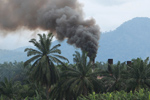Indonesia’s Minister of Forestry granted nearly 3 million hectares of plantation forestry concessions the day before the country’s president was due to sign a decree establishing a two-year moratorium on new logging licenses, reports a new analysis by Greenomics, an Indonesian environmental group.
Greenomics says minister Zulkifli Hasan signed away 2.9 million hectares of forest land to 44 companies on December 31, 2010. Most of the concessions are on secondary forest lands, although some primary forest was also involved, according to Greenomics. Roughly 1.2 million hectares of natural forest was granted in Papua (Indonesian New Guinea), while 1.03 million hectares was located in Kalimantan (Indonesian Borneo).
“Of the 1.2 million hectares [in Papua], 883,500 will be granted to 3 companies for the development of plantations to supply the pulp industry,” said Greenomics Indonesia Executive Director Elfian Effendi in a statement. “This means that the natural forest in these concessions will be felled to provide raw material for the pulp industry.”
Greenomics says forestry plantation licenses were also granted in Maluku, East Nusa Tenggara, West Nusa Tenggara, West Sulawesi, Central Sulawesi, North Sulawesi, West Sumatra, South Sumatra, Jambi, Gorontalo and Bangka Belitung.
“The new Minister of Forestry Decree was signed on 31 December 2010. So, it is reasonable to assume that it was intended to save the 44 companies from having to comply with the moratorium regulations.” said Elfian.
Indonesia has yet to approve the moratorium, which was due to take effect January 1, 2011 under the billion dollar forest conservation partnership signed last May with Norway. The moratorium is apparently being held up due to conflicting language between at least three different versions of the decree.
The Indonesian president’s climate change office did not immediately respond to request for comment.
Related articles
Does chopping down rainforests for pulp and paper help alleviate poverty in Indonesia?

(01/13/2011) Over the past several years, Asia Pulp & Paper has engaged in a marketing campaign to represent its operations in Sumatra as socially and environmentally sustainable. APP and its agents maintain that industrial pulp and paper production — as practiced in Sumatra — does not result in deforestation, is carbon neutral, helps protect wildlife, and alleviates poverty. While a series of analyses and reports have shown most of these assertions to be false, the final claim has largely not been contested. But is conversion of lowland rainforests for pulp and paper really in Indonesia’s best economic interest?
Will Indonesia’s big REDD rainforest deal work?

(12/28/2010) Flying in a plane over the Indonesian half of the island of New Guinea, rainforest stretches like a sea of green, broken only by rugged mountain ranges and winding rivers. The broccoli-like canopy shows little sign of human influence. But as you near Jayapura, the provincial capital of Papua, the tree cover becomes patchier—a sign of logging—and red scars from mining appear before giving way to the monotonous dark green of oil palm plantations and finally grasslands and urban areas. The scene is not unique to Indonesian New Guinea; it has been repeated across the world’s largest archipelago for decades, partly a consequence of agricultural expansion by small farmers, but increasingly a product of extractive industries, especially the logging, plantation, and mining sectors. Papua, in fact, is Indonesia’s last frontier and therefore represents two diverging options for the country’s development path: continued deforestation and degradation of forests under a business-as-usual approach or a shift toward a fundamentally different and unproven model based on greater transparency and careful stewardship of its forest resources.